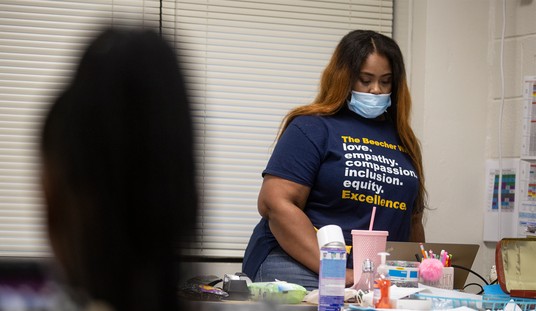Old and busted: Scott Walker didn’t finish his college degree, so he can’t be trusted to be a competent leader! New hotness: Scott Walker is so clever that his policies can retroactively cause layoffs that occurred before his election! John McCormack catches this whopper from Gail Collins at the New York Times, where fact-checking seems to have gone out of style:
Mainly, though, The Speech was about waging war on public employee unions, particularly the ones for teachers. “In 2010, there was a young woman named Megan Sampson who was honored as the outstanding teacher of the year in my state. And not long after she got that distinction, she was laid off by her school district,” said Walker, lacing into teacher contracts that require layoffs be done by seniority.
All of that came as a distinct surprise to Claudia Felske, a member of the faculty at East Troy High School who actually was named a Wisconsin Teacher of the Year in 2010. In a phone interview, Felske said she still remembers when she got the news at a “surprise pep assembly at my school.” As well as the fact that those layoffs happened because Walker cut state aid to education [emphasis added].
Actually, Wisconsin names four teachers of the year, none of which has ever been Megan Sampson, who won an award for first-year English teachers given by a nonprofit group. But do not blame any of this on Sampson, poor woman, who was happily working at a new school in 2011 when Walker made her the star victim in an anti-union opinion piece in The Wall Street Journal. At the time, she expressed a strong desire not to be used as a “poster child for this political agenda,” and you would think that after that the governor would leave her alone. Or at least stop saying she was teacher of the year.
If that were true, why would Walker be telling this story at all? “Hey, vote for me because I turned a great teacher into an unemployed case of despair”? In what universe would someone brag about that, especially in the context of campaigning for higher office? Surprisingly or not, neither Collins nor her editor bothered to ask themselves that question, which speaks volumes about the intellectual level of the New York Times’ editorial section.
In fact, Walker tells that story, as John notes, because the layoffs occurred before his election. The Wisconsin budget had gotten out of control, thanks in large part to a racket from public-employee unions called the WEA Trust, which shook down taxpayers through overpriced benefits packages. Prior to 2011, the state had eliminated teacher positions in an attempt to control spiraling costs. Walker’s PEU reform took benefits packages from union control, which saved the state and school districts enough money that Wisconsin could balance its budget while eliminating the cuts to K-12 education that would have otherwise been necessary. John explains this:
The truth is that Walker’s reforms actually saved teachers’ jobs. Right before the 2012 Wisconsin recall election, Walker’s Democratic opponent Tom Barrett couldn’t name a single school that had been hurt by Walker’s policies. When Walker’s 2014 Democratic opponent Mary Burke was asked to name any schools hurt by Walker’s collective bargaining reform, she relayed an anecdote she’d heard secondhand about one school. Burke’s story didn’t check out, and the superintendent of that school wrote a letter telling Burke she didn’t know what she was talking about.
This wasn’t an esoteric side issue in the public debate, either. The danger to cuts in education without the PEU reform was the key issue in the Fleebagger crisis four years ago, and it became the central issue in both the 2013 recall election and Walker’s re-election campaign last year. The reform of PEU collective bargaining and their impact on the budget were widely discussed, as was the fact that the Republican-led government avoided the kind of staffing cuts that Collins now wants to blame on Walker. The only way one could possibly not understand this is to have slept through one of the more intriguing political stories over the last four years, or to remain deliberately obtuse.
It’s important, as John concludes, to check one’s facts before publication. It’s even more important to pay attention in the first place.
Update: Minor edits for style.







Join the conversation as a VIP Member